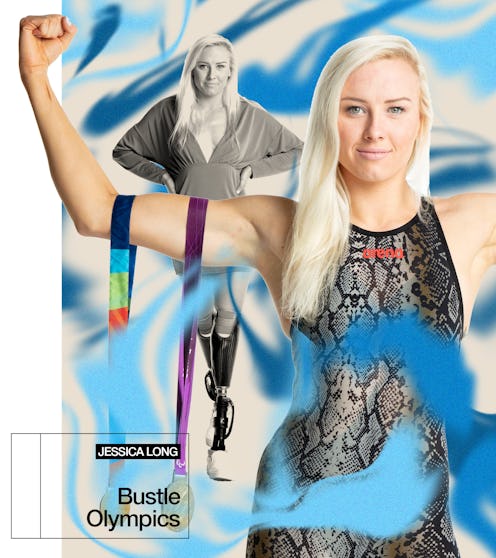The Olympics Warm-Up
How Swimmer Jessica Long Is Training For The Paralympics
"When I feel put together, I'm going to swim fast."

Paralympic swimmer Jessica Long was the only girl with missing legs on her swim team when she was 10 years old, but that didn’t stop her from falling in love with the sport. “I loved that I could take off my prosthetics,” she tells Bustle. “I felt really strong, capable, and powerful, and I kept going back.”
The athlete was born in Russia with a lower-leg bone missing due to a condition called fibular hemimelia. Her parents adopted her at 13 months old, moved her home with them to Maryland, and, at 18 months, had her lower legs amputated so that she could be fitted with prosthetics and learn to walk.
“They found out soon after that I was very active,” Long tells Bustle. “With fibular hemimelia, I would have to sit, recover, and rest every few months, so I really learned to appreciate being on the move.”
After perfecting her skills in the pool, she made her Paralympic debut as the youngest competitor on the swim team at 12 years old, where she won three gold medals. She’s since racked up 20 more medals —including 13 golds — at four consecutive Paralympics in various free, breast, back, and fly races, making her the second most-decorated Paralympian in American history.
And she’s not done yet: The 29-year-old is set to compete at the 2021 Tokyo Paralympics later this August. Below, Long details her training routine for the upcoming games, her underwater beauty secrets, and what she does to unwind when she’s not in the pool.
What does a day of training look like for you?
I moved out here to the [Colorado Springs Olympic & Paralympic Training Center], which is like college where you go from building to building. Here, we go from the weight room to Pilates to sports medicine to the pool. I swim nine times in six days with two intense weightlifting sessions per week. Every day is different, whether it’s recovery or sprint or distance [work].
Is there a part of your training that you find ridiculously hard?
Back when I was 18, I used to climb these ropes that would hang in the middle of the pool that go up to a catwalk. You climb up the ropes, you do pull-ups on the catwalk, then climb down or drop into the pool. The feeling of being able to [still] do that today, 10 years later, I’m like, “Oh my gosh!” Mentally, it’s so tough to get up there. But it’s when I feel the most confident.
How do you recover from such intense training?
I am obsessed with taking hot Epsom salt baths. My favorites are Dr. Teal’s lavender and eucalyptus [salts]. It’s the most relaxing way to recover: just sweating out all the toxins.
“When I feel put together, I'm going to swim fast.”
I love swimming and it's a huge part of my life, but there's so much more life to live after being in the pool. I also love podcasts, documentaries, reading, and learning. Having that balance is a really important part of my recovery.
What else do you do for self-care?
I am such a multitasker with self-care. If I’m taking a bath, I’m also whitening my teeth, I have a face mask and hair mask on — I do it all. Calling friends is also such a big part of my self-care. I love checking in with people, so I do that a couple of times a week with my girlfriends, family, or my husband.
Do you have a beauty routine on race day?
Absolutely! It’s part of my routine every single morning because when I feel put together, I'm going to swim fast. I am a M.A.C. girl. I also love Lancôme mascara. And bronzer is one of my favorite things in the world — I like using it as an eyeshadow.
People think I’m crazy because I don’t wear waterproof mascara, but I don’t need to because I’m a professional swimmer so I know how to not get my eyes wet! I already have my packing list for Tokyo, and one thing I’m bringing is a mini makeup bag for the pool.
How do you pump yourself up for a big race?
I try to control what I can. When I get to the Paralympics, I’ll know that I’ve done everything in my power to be ready, from sleep to nutrition to mental health to swimming and weightlifting. At that point, no matter what happens in the pool, you come out satisfied.
I also distract myself before a race in the call room with all the competitors by looking at old pictures and videos while listening to music and just remain calm and relaxed.
The games are just weeks away — what are you looking forward to as the Paralympics approach?
Of course I want to stand on top of the podium, but I'm just super excited to race after everything was postponed a year.
I’m also so excited for the coverage that Paralympics is getting and for people to know more about it. There’s a lot of confusion about what it means: “Para-” means “parallel” to the Olympic games. We’re all one team!
This interview has been edited and condensed.
This article was originally published on